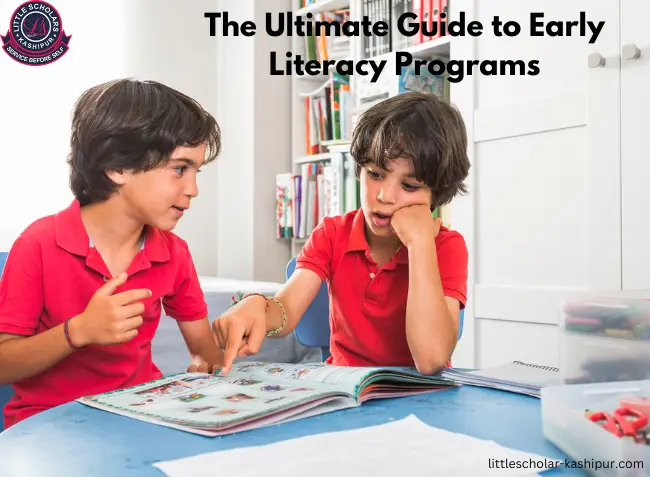Early literacy is the foundation of a child's educational journey. It's not just about learning to read and write but developing a love for language, stories, and learning. In this guide, we'll explore everything you need to know about early literacy programs, their benefits, and how to choose the best one for your child.
What Are Early Literacy Programs?
Definition and Purpose
Early literacy programs are structured initiatives designed to help young children develop foundational literacy skills before they enter formal schooling. These programs aim to foster skills such as phonemic awareness, vocabulary, letter recognition, and comprehension through engaging and age-appropriate activities.
Key Components
Effective early literacy programs typically include interactive read-alouds, songs, games, and activities that promote listening, speaking, reading, and writing. They also involve a combination of direct instruction and play-based learning to keep children engaged and motivated.
Benefits of Early Literacy Programs
Cognitive Development
Early literacy programs play a crucial role in cognitive development. They help children develop critical thinking and problem-solving skills by exposing them to new ideas and concepts through books and storytelling.
Language Skills
These programs enhance children's language skills by expanding their vocabulary and improving their ability to understand and use language effectively. Regular exposure to new words and sentence structures helps children become more proficient communicators.
Social-Emotional Growth
Participating in early literacy programs also supports social-emotional development. Children learn to express their thoughts and emotions, interact with peers, and build confidence in their abilities, which are essential skills for their overall well-being.
Types of Early Literacy Programs
School-Based Programs
Many schools offer early literacy programs as part of their preschool or kindergarten curriculum. These programs are often designed to align with educational standards and provide a structured learning environment.
Community Programs
Community organizations, libraries, and non-profits often run early literacy programs that are accessible to families. These programs may include storytimes, reading clubs, and family literacy events.
Online Programs
With the rise of technology, there are numerous online early literacy programs available. These digital platforms offer interactive and engaging activities that children can access from home, making literacy learning more flexible and convenient.
Key Elements of Successful Early Literacy Programs
Qualified Educators
Having trained and experienced educators is vital for the success of any early literacy program. Educators should be knowledgeable about child development and skilled in using age-appropriate teaching strategies.
The Essential Guide to Jerome Bruner's Theory of Cognitive Development
Evidence-Based Curriculum
Effective programs are built on evidence-based curricula that have been proven to enhance literacy skills. These curricula typically include a mix of phonics, vocabulary building, comprehension strategies, and writing activities.
Parental Involvement
Parental involvement is a significant factor in the success of early literacy programs. Programs that encourage parents to engage in their child's literacy development at home tend to see better outcomes.
How to Choose the Right Early Literacy Program
Assessing Child's Needs
Every child is unique, so it's important to choose a program that fits your child's individual needs and learning style. Consider their interests, strengths, and areas where they may need extra support.
Evaluating Program Quality
Seek for initiatives that have a successful track record. Research the program's curriculum, teaching methods, and outcomes. Other helpful resources include reading reviews and speaking with other parents.
Considering Logistics and Costs
Practical considerations such as location, schedule, and cost are also important. Choose a program that is convenient for your family and fits within your budget.
Implementing Early Literacy at Home
Creating a Literacy-Rich Environment
Make your home a place where literacy thrives. Fill it with books, writing materials, and opportunities for storytelling. Create a cozy reading nook and encourage daily reading.
Daily Reading Routines
Establishing a daily reading routine is one of the most effective ways to support early literacy. Read with your child every day, making it a special and enjoyable activity.
Interactive and Play-Based Learning
Incorporate literacy into play. Use games, puzzles, and interactive activities to make learning fun. Encourage your child to tell stories, act out scenes from books, and play with words.
Challenges and Solutions in Early Literacy Programs
Accessibility Issues
Not all families have easy access to quality early literacy programs. To address this, look for community resources, and online programs, or create a home-based literacy plan.
Engaging Reluctant Readers
Some children may be reluctant to engage in literacy activities. Find books that match their interests, use interactive tools, and be patient. Celebrate small successes to build their confidence.
Sustaining Long-Term Interest
Keeping children interested in literacy over time can be challenging. Rotate books and activities regularly, introduce new and exciting materials, and involve children in choosing what they want to read.
Student Leadership Development: Nurturing Future Leaders
Case Studies of Successful Early Literacy Programs
Example 1: Success in a School Setting
A local elementary school implemented a comprehensive early literacy program that included daily read-aloud sessions, phonics instruction, and family literacy nights. The program resulted in significant improvements in reading scores and parental engagement.
Example 2: Community-Driven Programs
A community center launched a reading club for preschoolers, involving volunteers and local authors. The program created a strong sense of community and fostered a love of reading among children and their families.
Example 3: Effective Online Literacy Programs
An online literacy platform offered interactive e-books, games, and virtual storytimes. Families reported increased engagement in reading activities, and children showed measurable gains in literacy skills.
The Role of Technology in Early Literacy
Digital Tools and Resources
Technology can be a valuable tool in early literacy education. Interactive e-books, educational apps, and online libraries provide diverse resources that can enhance learning.
Balancing Screen Time with Traditional Methods
While technology offers many benefits, it's important to balance screen time with traditional literacy activities. Encourage children to enjoy physical books, writing, and hands-on activities alongside their digital learning.
Parental Involvement in Early Literacy Programs
Encouraging Reading at Home
Parents can make a big impact by reading regularly with their children. Choose diverse and interesting books, ask questions, and discuss stories to deepen understanding and enjoyment.
Building a Supportive Learning Environment
Create an environment that supports literacy by providing access to books, writing materials, and opportunities for storytelling. Show enthusiasm for reading and learning to inspire your child.
Resources for Parents
Many resources are available to help parents support their child's literacy development, including websites, books, and community programs. Make the most of these resources to improve the educational experience for your child.
Professional Development for Educators
Importance of Training
Ongoing training is crucial for educators to stay current with the latest research and teaching strategies in early literacy. Well-trained teachers are better equipped to meet the diverse needs of their students.
Continuing Education Opportunities
Educators should seek out continuing education opportunities, such as workshops, conferences, and online courses, to expand their knowledge and skills.
Collaboration and Support Networks
Building a network of fellow educators can provide valuable support and opportunities for collaboration. Sharing ideas and resources can enhance the effectiveness of early literacy programs.
Policy and Advocacy for Early Literacy
Importance of Early Literacy Policy
Strong early literacy policies can ensure that all children have access to high-quality literacy programs. These policies can support funding, resources, and training for educators.
Advocating for Funding and Resources
Advocates can play a key role in securing funding and resources for early literacy programs. Engaging with policymakers, community leaders, and organizations can help raise awareness and support.
Community and Governmental Support
Collaboration between communities and governments is essential for the success of early literacy programs. Working together can create a robust support system for children and families.
Future Trends in Early Literacy
Innovations in Teaching Methods
The field of early literacy is continually evolving. Innovations in teaching methods, such as the use of multimedia and interactive technologies, are enhancing the way children learn to read and write.
Integration of Technology
The integration of technology into early literacy programs is likely to continue growing. Digital tools and resources will play an increasingly important role in supporting literacy development.
Research and Development
Ongoing research is crucial for understanding how children learn best and how to design effective literacy programs. Continued investment in research and development will drive future advancements in early literacy education.
A Complete Guide to the Power of Parental Involvement in Education
Conclusion
Early literacy programs are essential for laying the foundation for a child's lifelong learning journey. By choosing the right program and actively supporting your child's literacy development at home, you can help them build the skills they need to succeed. Remember, the journey of learning to read and write should be enjoyable and engaging, setting the stage for a lifelong love of learning.




